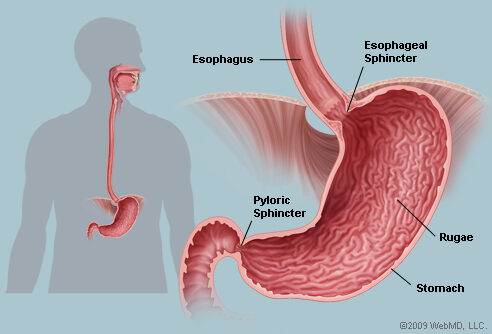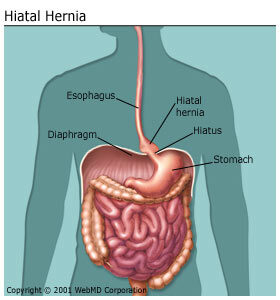Heartburn (Gastro-Oesophageal Reflux Disease)
Causes of heartburn
When you eat, food passes from your mouth down a tube called the oesophagus. To enter the stomach, the food must pass through an opening between the oesophagus and stomach which is called the oesophageal sphincter. This opening acts like a gate to allow food to pass into the stomach.
This opening usually closes as soon as food passes through. Sometimes it doesn't close all the way and acid from your stomach can get through the opening and into your oesophagus. This is called reflux. Stomach acid can irritate the oesophagus and cause heartburn.

Hiatal hernia's can also cause heartburn. A hiatal hernia is a condition in which part of the stomach is pushed up through the diaphragm (the muscle wall between the stomach and chest) and into the chest. Sometimes this causes heartburn.

Trigger factors for heartburn
The following can make heartburn worse:
- Cigarette smoking
- Coffee (both regular and decaffeinated) and other drinks that contain caffeine
- Alcohol
- Carbonated drinks
- Citrus fruits
- Tomato products
- Chocolate, mints or peppermints
- Fatty foods or spicy foods (such as pizza, chili and curry)
- Onions
- Lying down too soon after eating
- Being overweight or obese
- Aspirin or ibuprofen (one brand name: Motrin)
- Certain medicines (such as sedatives and some medicines for high blood pressure)
What can be done to prevent heartburn?
- Place 6- to 9-inch blocks under the legs at the head of your bed to raise it.
- Try to eat at least 2 to 3 hours before lying down. If you take naps, try sleeping in a chair.
- If you smoke, quit.
- Lose weight if you're overweight.
- Don't overeat.
- Eat high-protein, low-fat meals.
- Avoid tight clothes and tight belts.
- Avoid foods and other things that give you heartburn
- Try to remain upright after a meal as this reduces the risk of acid going up your esophagus. Avoid bending over or straining to lift heavy objects.
- Do not exercise immediately after a meal. This gives your stomach time to empty.
- Chewing gum encourages the production of saliva, which can soothe your esophagus and wash acid down into your stomach.
- Certain medications can exacerbate heartburn eg: anti inflammatories (such as Aspirin, voltaren, brufen), and drugs used to treat osteoporosis, blood pressure, asthma and depression.
What are the complications of heartburn?
- Long-term heartburn damages the lining of the oesophagus which can lead to cancer or the oesophagus.
- Heartburn can often be a misleading sign in heart attacks.
What medications are available to treat heartburn? ( And what you should know about these medicines)
Antacids
- Antacids do not decrease the production of acid in the stomach. They work by increasing the gastric mucosal defensive mechanisms by either increasing mucus production of buffering the acid in the stomach
- Antacids neutralise acid in the stomach
- Antacids are often combined with simethicone which helps to decrease flatulence (gas).
- Common constituents of antacids include:
- Aluminium: causes constipation
- Calcium carbonate: Long term use can lead to kidney use.
- Magnesium: causes diarrhoea. It is dangerous to use magnesium if you have kidney failure as the kidneys cannot excrete the magnesium. Often antacid preparations combine magnesium with either aluminium or calcium to counteract the side effects
- Sodium bicarbonate: It can cause other medical problems in people with congestive cardiac failure, hypertension and renal disease.
- Alginates: These include sodium alginate and alginate acid. They line the oesophagus and prevent the stomach acid from damaging the lining.
Histamine-2 blockers
Histamine stimulates acid production, especially after meals, so H2 blockers are best taken 30 minutes before meals. They can also be taken at bedtime to suppress night time production of acid.
Examples: Cimethidine and Ranitidine (Zantac)
Side effects: headache, abdominal pain, diarrheoa, nausea, increased gas production, sore throat, runny nose, and dizziness.
Proton Pump Inhibitors (PPI’s)
Parietal cells are found in the stomach lining contain enzymes that make hydrogen ions. These hydrogen ions are pumped into your stomach where they create stomach acid. PPIs neutralize the active enzymes in some parietal cells. When the enzymes are neutralized, fewer ions are pumped out. This means the acid in your stomach becomes weaker. The parietal cells take 24 hours or longer to make more enzymes which is why PPI’s are effective at managing heartburn symptoms for longer than other drugs.
It has to be taken on an empty stomach because PPIs only neutralize the enzymes in active parietal cells. These parietal cells do not become active until you eat. It takes a while for PPI to circulate in your blood therefore it should be taken at least 60 minutes before eating.
Examples: Pantoprazole(Peploc), Lansoprazole ( Lancap) esomeprazole ( Nexiam), omeprazole(Omez/Altosec/Losec).
Side effects: Long term use of PPI;s have been associated with low levels of magnesium, vitamin B12, hip fractures and diarrhoea.
SOME MEDICATIONS USED TO TREAT HEARTBURN CAN RESULT IN MISCARRIAGES. DO NOT USE IN PREGNANCY.
